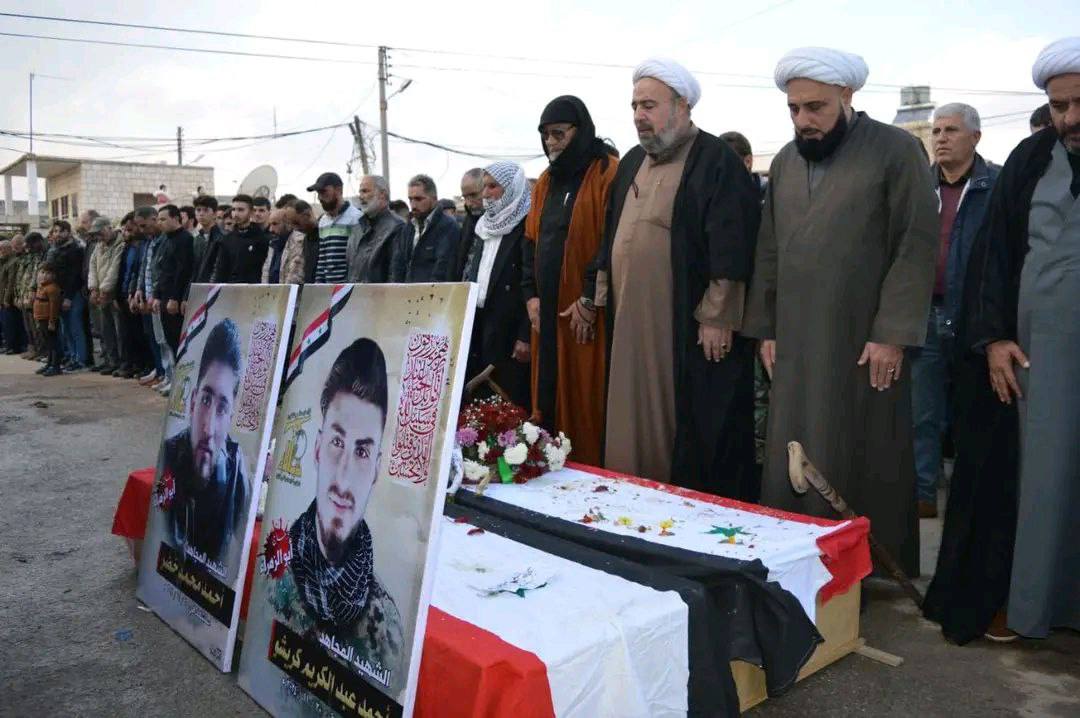Israel’s airstrikes last week targeted the strategic Syrian city of Palmyra for the first time, marking an unprecedented escalation in the region. Aircraft reportedly entered Syrian airspace via the US-controlled Al-Tanf area, striking sites including a café and military targets, and killing 68 people, primarily pro-Iranian militia members.
The Syrian Observatory for Human Rights reported 68 fatalities, including 42 Syrian pro-Iranian militiamen—five of whom were Hezbollah-affiliated officers—22 non-Syrians from the Iraqi militia Harakat al-Nujaba, and four Hezbollah members.

Several funerals took place in the town of Nubl in the Aleppo Governorate, a stronghold for Hezbollah loyalists. (Screenshot: Facebook)
Palmyra, a central hub in Syria once under ISIS control until retaken in 2015, is strategically vital for Hezbollah and Iran as it connects their operations in Lebanon and Iraq.
Social media images shared by pro-regime accounts showed funerals near the Russian base at Palmyra Air Base, with Hezbollah symbols visible on coffins. Funeral attendees included masked individuals, as well as military uniforms not typically worn by Syrian army forces. Several funerals took place in the town of Nubl in the Aleppo Governorate, a stronghold for Hezbollah loyalists.
Mustafa Sheikh, a former Syrian brigadier general, noted the masks worn at funerals suggest that many of the deceased were Hezbollah fighters rather than Syrians, as Syrian soldiers rarely use masks. The masks are likely meant to conceal their identities and avoid future targeting.

Masks worn at funerals suggest that many of the deceased were Hezbollah fighters rather than Syrians, as Syrian soldiers rarely use masks. (Screenshot: Facebook)
Sheikh emphasized possible coordination between Russia and Israel, given that the strikes occurred near the Russian military base at Palmyra, reflecting ongoing collaboration between the two nations.
Clerics seen at the funerals wore Iranian-style religious attire, further indicating the involvement of non-Syrian personnel. This was confirmed by Ayman Mohammed, a Syrian cleric, in a brief comment to The Media Line.

Clerics seen at the funerals wore Iranian-style religious attire, further indicating the involvement of non-Syrian personnel. (Screenshot: Facebook)
Israel frequently coordinates with Russia before conducting strikes in Syria, as both nations have confirmed.
A local resident, who requested anonymity, revealed to The Media Line that Palmyra had become a base for Hezbollah, Harakat al-Nujaba, and Iranian forces, whose families occupied homes abandoned by civilians displaced for opposing the Assad regime.
Harakat al-Nujaba, an Iraqi militia aligned with Iran and designated a terrorist organization by the US, operates a media outlet, Al-Nujaba TV, and is led by Akram al-Kaabi. The group has been accused of numerous civilian killings in Syria alongside regime forces.
Syria’s Ministry of Foreign Affairs condemned the strikes as aggression, noting that not only pro-Iranian militia members but also Syrian soldiers, including officers, were among the casualties, a potential escalation in Israel’s targeting strategy.
Analysts believe Syrian President Bashar Assad cannot afford to sever ties with Iran, despite growing tensions. Israel’s strikes could expand to broader targets within the Assad regime as conflicts with Hezbollah, Iran, and Hamas intensify.
Iran’s support for Assad and Hezbollah has been pivotal in the Syrian civil war, while both also back Hamas, placing them at odds with Israel. Last week, Israeli airstrikes in Damascus killed 15 Palestinian Islamic Jihad members, further escalating regional tensions.